May 16: E-Stories
RUattacksUA CombatSit BehindLInes Armenia InRussia Allies US EU A&P Razom ISW MacKay UKDef NoelReport Browder Blinken Fico Panyi Georgia Wilders EEMF EUComm OC Mtavari Putin Scarr Chapman Walker Pryma
Catching up…
EA Worldview’s Ukraine Up-date- hop over to Scott’s amazing hourly Ukraine up-date page. I’ll fill in with some bits and bobs.
Stories we’re following…
Zelensky postpones all international trips, as Russian forces advance through Kharkiv region
President Zelensky will halt all international events scheduled for the coming days, his office announced on Wednesday, as Russian troops push into the northeastern Kharkiv region. It came days after Ukraine’s top military general warned fighting had "significantly worsened" in Kharkiv, as Russia claimed to have captured four further villages as it expanded its surprise cross-border offensive.
Russian attack against Kharkiv injures at least 2. Governor Oleh Syniehubov said a five-story residential building in the Shevchenkyvskyi district was hit. At least two people were injured.
Updated: Russian airstrike targets Kherson, at least 19 injured. Russian forces carried out an airstrike against central Kherson on May 15, injuring at least 19 people, local authorities reported.
Combat Situation Update
"Russian tanks have entered the northern part of Vovchansk and are shooting inside the city," National Police officer Ihor Kharchenko reports. Ukrainian military sources and the General Staff itself consider the situation inside Vovchansk as very tense and difficult.
Michael MacKay: In the north of Kharkiv region, the intensity of combat increased. Ukrainian defenders have already repelled 10 attacks by the russian fascist invaders in the areas of Slobozhans'ke, Vovchans'k, Starytsya and Lyptsi. "The situation has been partially stabilized. The north-western outskirts of Vovchans'k are being cleaned up." Source: General Staff of the Armed Forces of Ukraine operational information as of 19:00 on 15 May 2024 regarding the Russian invasion
General Staff: Russian forces 'partially pushed out' from Vovchansk. Ukrainian forces repelled Russian attacks in the Vovchansk direction in Kharkiv Oblast and "partially pushed out enemy forces from the town," the General Staff of Ukraine's Armed Forces said on May 15.
Ukrainian Missiles headed to Simeropol, Crimea. The Kerch bridge was closed for traffic in the evening May 15. Russian channels report that 12 missiles are possibly heading for the peninsula. Loud explosions were reported in Simferopol. Fires were also reported in Sevastopol, Dzhankoy, andHvardiis'ke.
Noel Report: the first footage from Belbek Air Base on Tuesday night. A surveillance camera records several explosions at the Air Base which was claimed to be hit with ATACMS missiles. Satellite images have been released showinigNew footage also shows the destruction of an ammunition depot in Sorokyne, occupied Luhansk region.
Russian sources report that there’s another fire at the Belbek Air Base on Wednesday night as well.
Russia said on Wednesday that a major airport near the city of Kazan, 1,000 kilometres (620 miles) from Ukraine, had been temporarily closed after the region was targeted by a Ukrainian attack drone, reports Agence France-Presse (AFP).
Behind the Lines
Ukraine’s war-torn economy faces a renewed threat as Russia’s intensifying war takes its toll on power plants and forces Kyiv to send key workers to the frontline, the European Bank for Reconstruction and Development has warned.
In its latest economic update, the EBRD cut its growth forecasts and said more than two years of fighting in Ukraine was affecting not only the warring countries but also their neighbours.
Beata Javorcik, the EBRD’s chief economist, said the war was “casting a long shadow” as she announced the bank had cut its growth forecast for the regions in which it operates from 3.2% to 3% this year.
Ukrainian presidential adviser Mykhailo Podolyak dismissed Putin’s comments on possible negotiations over his war in Ukraine as “hypocritical” on Wednesday.
“Once again, Putin’s hypocritical ‘negotiation’ activity … At the same time, Russia continues to burn cities in Donbas and is trying to break through in Kharkiv region, while simultaneously scaling up crimes against civilians,” he said on X.
Belarusian Hajun Project: Equipment of the Russian Armed Forces to be transferred to Belarus again?
@belzhd_live received information that the Belarusian Railway is again preparing to receive military cargo trains with military equipment, ammunition and personnel of the Russian Armed Forces. Among other things, trains from the occupied territories of Ukraine may be sent to Belarus.
@belzhd_live notes that currently, measures are already being taken to ensure the secrecy of these military transportations. We recall that back in February, we wrote that major military drills would be conducted in Belarus next year, during which it’s planned to transfer the Russian military contingent to the territory of Belarus by rail.
Moscow bagged €3 billion through a sanctions loophole that allows Turkey to relabel Russian oil and ship it to the EU.
On a balmy spring day last May in southern Turkey just 60 kilometers from the Syrian border, a tanker the length of two football fields pulled into the Toros Ceyhan terminal ready to pick up fuel.
Loaded with 150,000 barrels of gasoil — a fuel largely the same as diesel — the ship then departed on a three-day journey toward the Motor Oil Hellas refinery in southern Greece.
Ostensibly, the fuel was Turkish; Athens insists it doesn’t accept Russian-labeled cargoes, in compliance with an EU prohibition. But new research and reporting shows the shipment was likely just that: Russian oil hidden with new markings.
Medvechuk's yacht officially transferred to Ukrainian state. The Royal Romance, a 92-meter (300-foot) luxury yacht worth an estimated 200 million euros ($218 million), was seized by Croatian authorities in March 2022.
UK Defence Intelligence: The Kremlin’s war continues to have a profound effect on Russia domestically. Putin is exerting more control over its economy, bringing some 180 companies under state control since the invasion, with a likely worth of approximately $11.5 billion.
Reuters: US warns Raiffeisen that access to dollar system could be restricted due to Russia presence. Austria's Raiffeisen Bank International (RBI) was warned by the U.S. Treasury that its access to the U.S. financial system could be curbed due to its continued presence in the Russian market, Reuters reported on May 15.
Russian-backed protests against prime minister Nikol Pashinyan broke out in Yerevan, Armenia some days ago. The Armenian government has left the CSTO and began a process of steering closer to the EU and the United States, which began with the gifts presented to president Zelensky’s wife, Olena Zelenska.
The Prime Minister of Armenia, Nikol Pashinyan, was at the Copenhagen Democratic Summit on May 15.
Meanwhile in Russia
Putin says his regime is prepared to negotiate over the conflict in Ukraine in an interview with Chinese media on the eve of his planned visit to Beijing , the Associated Press (AP) reports. (Me: this is absurd. The only reason Putin says this is to set the narrative that Russia is ‘peaceful’ and can be used in the information space.)
“We are open to a dialogue on Ukraine but such negotiations must take into account the interests of all countries involved in the conflict, including ours,” Putin was quoted as saying by the official Xinhua News Agency on Wednesday.
Putin in China for ‘talks’ with Xi. Chinese state media confirmed the Russian president’s arrival for what it described as a state visit from an “old friend”. More on Putin’s ‘I need help’ tour in tomorrow’s E-Stories.
Putin said on Wednesday that Russia’s total defence and security spending may reach a little more than 8.7% of GDP in 2024, and that the money should be used carefully and effectively, Reuters reports. The Russian president told a meeting of the defence minister and top generals that Russian forces were every day improving their positions in all directions in Ukraine. (Me: this figure is absurd. It’s more upward of 30-35%.)
Russia warned the European Union that if the bloc imposed restrictions on Russian media then western reporters in Russia would feel a swift, harsh and painful response from the Russian state, reports Reuters.
European Commission vice-president Vera Jourova said that the EU would sanction Voice of Europe, a website accused of spreading pro-Russian disinformation, along with Rossiiskaya Gazeta, Ria Novosti and Izvestia, Bloomberg reported on 6 May.
“They felt our love before, but now they will have to feel the response,” Zakharova said. “We will respond with lightning speed and extremely painfully for the westeners.”
Angela Eagle: Bill Browder gave his testimony at a hearing in the UK about criminal cases for money-laundering. What he says is actually shocking—there have never been a criminal case opened against Russia in the UK since Putin came to power. I’m finding out if we have the same record in Italy.
Allied Support
At a press conference in Kyiv, Blinken announced an additional $2bn in foreign military financing from the US for Ukraine. He said new support from the US was coming at a “critical time”.
US Sec. Blinken said that Washington "does not encourage" Ukraine to strike with US weapons on Russian territory but that it "must decide for itself what to do." Most Western partners, including the US, opposed previously the weapons they transferred to Ukraine being used for strikes on Russian territory. The UK recently permitted such use. The Latvian FM also stated that some countries provided Ukraine with weapons, allowing strikes on Russia, but didn't specifically name the countries.
Blinken added that the US could sign a bilateral security agreement with Ukraine within weeks, and that Kyiv had already been doing the “heavy lifting” on the deal.
At the same press conference, Ukraine’s Foreign Minister, Dymtro Kuleba said, “Every delay of supply results in setbacks on the frontline”.
Estonia’s parliament has approved a proposal allowing the use of frozen Russian assets to pay compensation for war damage in Ukraine, the Baltic nation’s foreign ministry said in a statement on Wednesday. “We took a big step towards creating a precedent Europe could follow,” foreign minister Margus Tsahkna said, Reuters reports.
Britain’s shadow foreign and defence ministers have visited Kyiv to deliver a message that little would change when it came to British support for Ukraine if Labour won the general election expected later this year.
“We wanted to come now, in the run-up to the UK election, to ensure we take politics out of the UK’s support for Ukraine,” said John Healey, the shadow defence secretary, in an interview with the Guardian in Kyiv before leaving Ukraine. “There’s total support for Ukraine across the full breadth of the Labour party in and outside parliament,” he added.
Portugal’s new government is keen on ramping up sanctions on Russia over its invasion of Ukraine, environment and energy minister Maria da Graca Carvalho said on Wednesday, reports Reuters.
“In general, the Portuguese government is aligned with the European Union’s energy policies, namely with the measures that aim to ensure our strategic sovereignty … just as it is in favour of toughening sanctions” to pressure Russia to end the invasion, the minister said in a statement sent to Reuters.
EU member states on Wednesday agreed to impose a broadcast ban on online outlet Voice of Europe, accused of spreading Kremlin propaganda, diplomats said.
Agence France-Presse (AFP) reports that the officials, speaking on condition of anonymity, said bans would also be applied to three Russian media outlets: Izvestiya, Rossiiskaya Gazeta and Ria Novosti. The intelligence service in the Czech Republic in March busted an alleged Moscow-financed network using Prague-based outlet Voice of Europe to spread Russian propaganda.
The Netherlands has swung to the right. Unless there’s a last-minute hitch, the country’s next government will be made up of Geert Wilders’ far-right Party for Freedom (PVV), two center-right groups and the populist Farmer Citizen Movement (BBB), Wilders announced Wednesday.
“We have a governing agreement, so that’s very good news,” Wilders told the press. Wilders said discussions on a suitable PM candidate would be “picked up at a later moment.”
The coalition brokered by Wilders would include outgoing Prime Minister Mark Rutte’s People’s Party for Freedom and Democracy (VVD) and the centrist New Social Contract (NSC) party.
Slovak prime minister shot
Update May 16: prime minister Robert Fico is in stable conditions from the last reports.
Late on Wednesday the deputy prime minister, Tomáš Taraba, told the BBC he believed the operation had gone well. “I guess in the end he will survive,” Taraba said, adding: “He’s not in a life-threatening situation at this moment.”
May 15: BBC: The arrest of the attacker on the Slovakia’s PM. Slovak Prime Minister Robert Fico has been shot and wounded in Handlova, according to local media reports.
Mr Fico was shot as he greeted crowds in front of a cultural community centre in the town of Handlova, where a government meeting had been held, reports say. Several shots were heard, before his security detail bundled him into a nearby car.
A witness told the Dennik N website that she heard three or four shots and saw Mr Fico fall to the ground. She saw wounds to his head and chest. Two of the prime minister's guards quickly helped him and rushed him into a car. Local reports say he was then airlifted by helicopter to a nearby hospital. An official from Fico’s Smer party confirmed to that the prime minister was shot in the abdomen and is now in surgery.
More about this group from VSquare: Paramilitary organizations from Poland and Slovakia are tightening their partnership. Members of the Slovak Recruits and Strzelec have been training together on shooting ranges and exchanging weapons. Both groups are linked to far-right and pro-Russian movements.
The value of shares in Bank of Georgia and TBC, Georgia’s two largest banks, fell by 12% and 15% respectively on the London Stock Exchange in the past day. The drop in value comes after the foreign agent law was passed in its final reading in parliament.
EU Commission statement: We urge the Georgian authorities to withdraw the law, uphold their commitment to the EU path and advance the necessary reforms detailed in the 9 steps. The choice on the way forward is in Georgia's hands.
The EU stands with the Georgian people and their choice in favour of democracy and of Georgia's European future. The intimidation, threats and physical assaults on civil society representatives, political leaders and journalists, as well as their families is unacceptable. We call on the Georgian authorities to investigate these documented acts.
The European Council granted Georgia the status of a candidate country on the understanding that the relevant 9 steps set out in the Commission recommendation of 8 November 2023 are taken. These steps require human rights to be protected and civil society as well as media to be able to operate freely. They also refer to the need for depolarisation and the fight against disinformation.
Nevertheless, and despite large protests and unequivocal calls by the international community, the Georgian government ruling majority adopted the law “on transparency of foreign influence” in Parliament in third reading. The EU has clearly and repeatedly stated that the spirit and content of the law are not in line with EU core norms and values. It will undermine the work of civil society and independent media while freedom of association and freedom of expression are fundamental rights at the core of Georgia's commitments as part of the Association Agreement and of any EU accession path.
Estonian, Lithuanian, and Icelandic foreign ministers joint protest at parliament. The foreign ministers of Estonia, Lithuania, and Iceland joined the student march along Rustaveli Avenue from Heroes Square.
Representatives of the EU, NATO, and OSCE have condemned the adoption of the foreign agent bill by the Georgian parliament.
The EU foreign affairs chief, Josep Borrell, and the European Commission urged the Georgian authorities to withdraw the law which they underlined ‘negatively impacts Georgia’s progress on the EU path’ and to uphold ‘commitment’ to the path towards the EU, and pursue the nine reforms suggested by the EU after granting Georgia candidate status in December.
NATO Spokesperson Farah Dakhlallah termed the bill’s adoption ‘a step in the wrong direction’, and urged Georgia’s authorities to ‘change course’, while OSCE Chair-in-office Ian Borg condemned the use of violence against protesters.
Georgia May 15: the protests will continue until the law is revoked. A river of people marching on the right embankment in Tbilisi, protesting the Russian law.
President Salome Zourabichvili underlined today that she has no intention to cooperate with the ruling Georgian Dream party in her expected veto of the foreign agent law, adopted by the parliamentary majority on Tuesday.
After the law’s passing, Georgian prime minister Irakli Kobakhidze suggested that his party would be open to considering feedback from the Council of Europe’s Venice Commission if Zourabichvili reflected it in her veto of the law. Feedback from the Venice Commission is expected to be published early next week.
Speaking at a joint press conference with the foreign ministers of Latvia, Lithuania, Estonia, and Iceland who arrived in Tbilisi today, the Georgian president noted that her veto would not constitute entering into ‘false, artificial, misleading negotiations’ with the parliamentary majority.
‘No and never!’, she added. ‘No one should think that Georgia’s president can be used for saving the face of this government’.
Protests in Kutaisi, Georgia on May 15. There were also protests in Batumi. The university students have been organising and hitting the streets to show their disapproval of the Russian law and their support for their country’s entry into the EU which means their future.
Maria Prymachenko
There is so horror at the moment in Ukraine, on the front lines and in the Russian occupation zones. There are serious problems that Ukraine must face every day in order to survive as a nation. E-Stories focuses on so much doom and gloom, and occasionally, some hope. But there is still literature, music, beauty, and art.
Alexander Khara posted the video below, which features the art of Maria Prymachenko, a peasant. I often see her work posted, so I took a closer look at Maria’s life and art, and I thank Alexander for always bringing my attention to beauty in times of trouble.
Maria Prymachenko was born and spent all her life in the village of Bolotnya in the Ivankiv Raion, Kiev Oblast, situated only 30 km from Chernobyl. Although she never left Ukraine, but her “naive” art influenced artists such as Chagall and Picasso.
Maria took her first steps in art as a child, thanks also to the influence of her mother, an expert embroiderer. The little girl enjoyed creating drawings with needle and colored threads and painting the typical Easter eggs. But one episode was cathartic during her childhood, which she herself recounted as follows:
“Once, as a child, I was chasing a flock of geese. When I reached a sandy beach, on the river bank, before crossing a field dotted with wild flowers, I began to draw real and imaginary flowers on the sand with a stick… Later, I decided to paint the walls of my house using natural pigments. After that I never stopped drawing and painting."
Everyone was enchanted by the imagination and talent of the little girl, who thus embraced her passion. She was struck by polio which forced her to bed for a long time, but her illness contributed even more to bringing her closer to art.
Her works won major recognition at a national art exhibition of the USSR in 1936 and were successfully exhibited in Paris, Warsaw, Sofia, Montreal and Prague . In 1937 Mariya Prymachenko received the gold medal at the Paris Universal Exhibition , without ever leaving her Ukraine.
In Bolotnya she even founded an art school for children. Her intent was to create works that cheer people up and in her latest works she began to write phrases and maxims referring to the subjects she portrayed behind the canvases. UNESCO dedicated the year 2009 to Maria Prymachenko.
Enjoy the video…
The Misfits Russia Is Recruiting to Spy on the West- WJS
Low on cash and out of his most recent minimum-wage job, Ukrainian refugee Maxim Leha, then 22, had just found a new way to make ends meet in his newly adopted home of Poland.
The job advertised on the Telegram messaging app in early 2023 didn’t appear to demand much: Spray-paint graffiti on remote fences and highway underpasses for $7 a pop. When Leha answered, a man who identified himself as Andrzej wrote back. Within days, Andrzej had upped the ante: Leha was fixing cameras along railroad lines carrying Western military aid to neighboring Ukraine.
Weeks later, Leha and 15 others were arrested in the biggest publicized spy case in Poland’s history. Andrzej, it turned out, was a front for a Russian intelligence unit that was recruiting people such as Leha—drifters looking to make a quick buck—for spying and espionage jobs since late 2022.
Late last year, Leha received a six-year sentence on espionage charges, after a trial in which he was painted as a ringleader.
“It was easy money,” Leha recently said from a jail in the Polish city of Lublin, his lanky frame under the red jumpsuit given to detainees considered most dangerous.
It is unclear whether the information provided by Leha and the other recruits directly led to Russian strikes on the shipments of Western weapons that have regularly transited into Ukraine since Russia’s February 2022 invasion.
But Western officials say Russia has successfully combined camera footage with more sophisticated efforts such as satellite surveillance to trace shipments of hardware and ammunition from Poland and elsewhere to secret warehouses in Ukraine, where they have been hit by drones and guided missiles.
“These cheap and seemingly bumbling efforts are nothing to be sneered at,” a senior Western military intelligence official said. “They are part of a large toolbox of intelligence gathering that has helped Russia destroy key materiel with minimum investment.”
The case of the Polish spy ring opens a window onto Moscow’s renewed efforts to boost its espionage capabilities in Europe as the Kremlin is settling into a long confrontation with the West. Part of their network was hit when more than 600 Russian diplomats were expelled in the wake of the 2022 invasion. The U.K. has said that two thirds of those expelled from Europe were likely spies.
Now Russia is using chat platforms such as Telegram to recruit young, marginalized people, often immigrants and mostly men, to undertake mundane yet damaging acts of spying and sabotage. The approach—low-cost and low-risk for Moscow’s spy services—allows Russia to stoke anti-Western sentiment and reap potentially important intelligence while letting their recruits take the fall.
“Now they are trying to reconstruct their capabilities,” said Jacek Dobrzynski, spokesman for Poland’s special services coordination. [continue]
‘You say you are a musician, they beat you more’: the Ukrainian sax player who survived Putin’s torture prisons
Oleksandra Matviychuk participated in the Second World Meeting on Human Fraternity, organized in the Vatican by the Fratelli Tutti Foundation. She presented the Pontiff with an autographed copy of Stanislav Aseyev’s “Izolyiatsia”, which chronicles his life in the Russian torture camp in Donetsk. Aseyev is currently serving on the front lines. She said, “Occupation is war, and we want peace.” Her appeal to the Pope is strategic as he has very close links to the Russian Orthodox Church.
Russian occupation means living under conditions that bring to death or severe trauma. The Russian camps were exposed in 2014 as their forces moved across Donetsk and Luhansk. Shaun Walker for the Observer has written about the experience of Ukrainian soldiers and how they managed to survive the camps.
What scares me the most is that should Ukrainian territory continue to fall, more and more Ukrainians will be subjected to the camps and the torture and trauma which it entails. It also means that a young and not so young generation of Ukrainians may be enlisted to fight for Russia. The kind of education that Ukrainian children are now exposed to in the occupied territory is purposefully designed to create a generation that will forget who they are, and brainwashed into fighting against the West.
This is what most of the narration around the war forgets: we focus on maps and troop movements, but the story of life under Russian occupation remains on the sidelines.
When Yuriy Merkotan enlisted in Ukraine’s national guard in 2020, it was not because he wanted to fight. A saxophonist living in the southern port city of Mariupol, there were few opportunities to play music professionally. So when a spot became free in a 16-person band attached to a national guard brigade, he jumped at the chance.
But when Russian forces put Mariupol under siege in February 2022, the band members were called to duty. They ended up inside Azovstal, the sprawling factory that became the last bastion of Ukrainian defence as the Russian occupation proceeded to its grim conclusion.
When Ukrainian forces in Azovstal laid down their arms in May 2022, Merkotan and other musicians were among more than 2,000 Ukrainians taken into Russian captivity.
Over 20 months in Russian prisons, he lost nearly 60kg of body weight, and was subjected to a gruesome routine of physical and psychological torment.
He was freed in January this year, but the story of his time in Russian captivity shines a light on the grim conditions faced by thousands of Ukrainians taken prisoner by Russia over the past two years. It also serves as a reminder that 23 musicians, from three Mariupol ensembles, remain in Russian captivity, as the two-year anniversary of the Russian takeover of the city approaches next week.
“I tried to explain that I was a musician but it didn’t work. You say you are a musician and it irritates them so much they beat you more, and accuse you of lying,” said Merkotan, during an interview in a Kyiv cafe.
While in imprisonment, he was driven daily to the occupied city and forced to dig at gunpoint for a month.
“My team dug up 200 bodies at least. It was August, hot, and the smell was disgusting. Surprisingly, nobody vomited. I guess the stress was too much, but we all got terrible diarrhoea. On the fourth day, I stopped eating because as soon as you ate you had to run to the toilet,” he recalled.
The humiliations of Russian prison made Merkotan miss the conditions back in occupied Ukraine. At Borisoglebsk, prisoners were forbidden from sitting or lying between 6am and 10pm, when they were forced to stand up in their cells. Many developed serious leg injuries. The speaker system played the same few recorded radio programmes about Ukrainian Nazis over and over again.
Twice a day, the inmates had to assemble in the corridor, face against the wall and legs apart as wide as they could manage. They were then assaulted by guards who beat them with rubber truncheons, and sometimes used handheld electric shockers [continue]

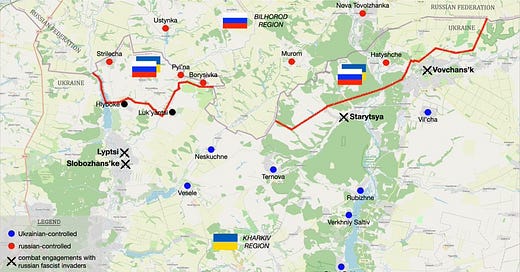




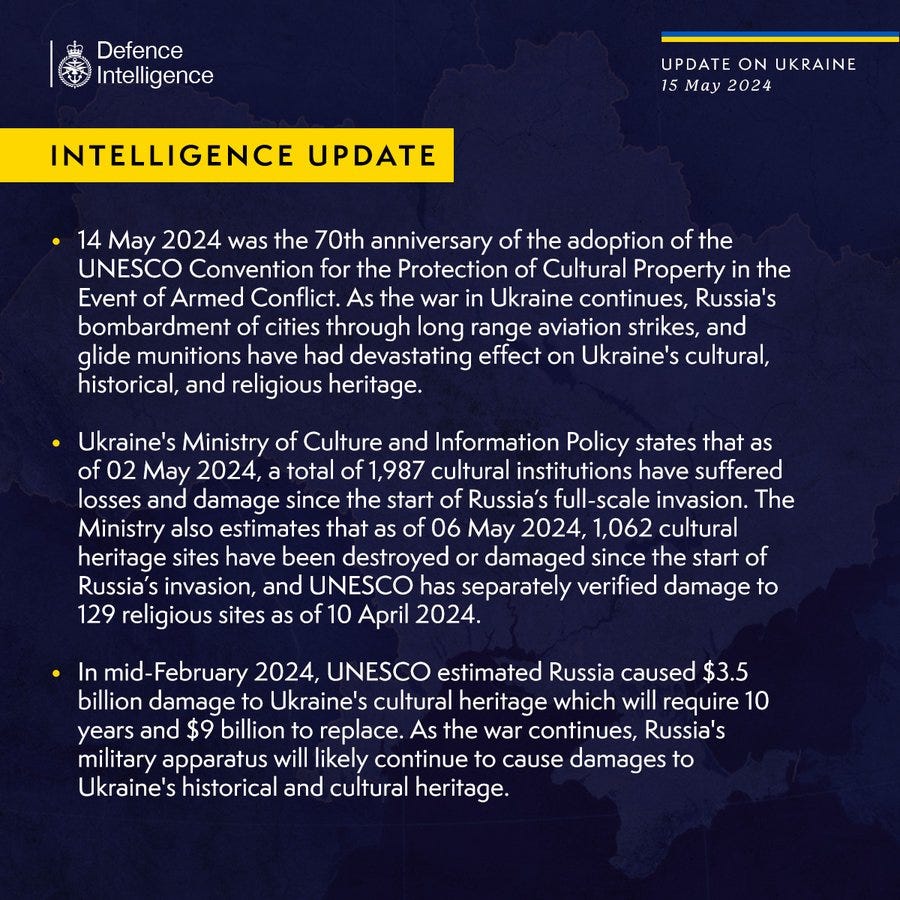


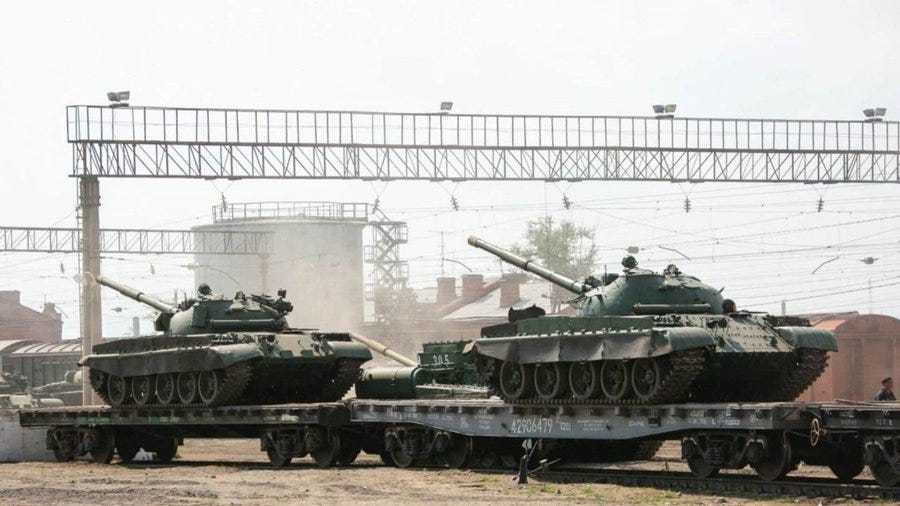





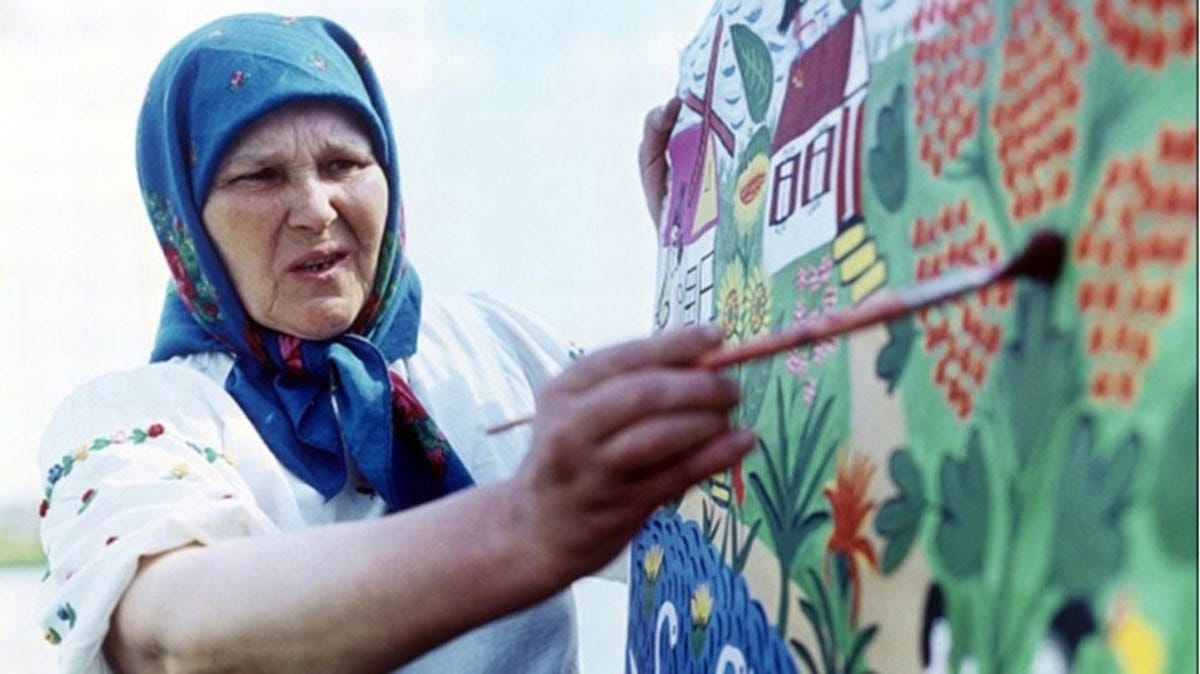
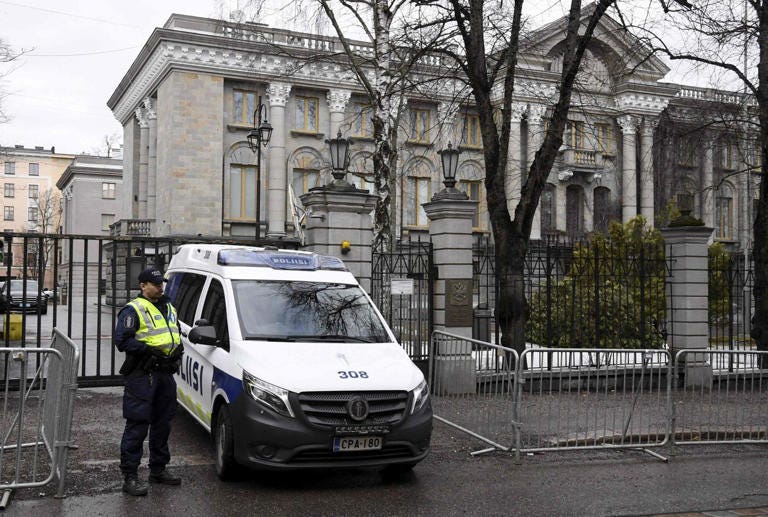
Those Georgia videos are chilling! These are protests that need more attention from the West! I cannot seem to get anyone to understand how much impact the actions of Russia have in the day to day life and future of Europe and the US as we all as other countries striving for democracy.
Do you have any recs for Georgian social media accounts to follow? Unfortunately being based in the US if you type Georgia into IG it just comes up with everything to do with football and sororities *eye roll*. Ha!